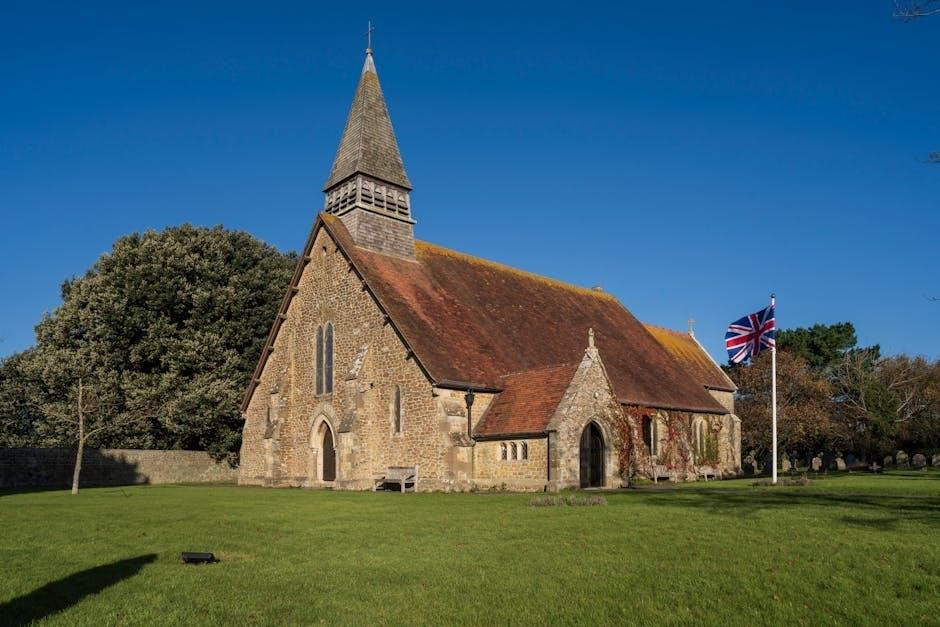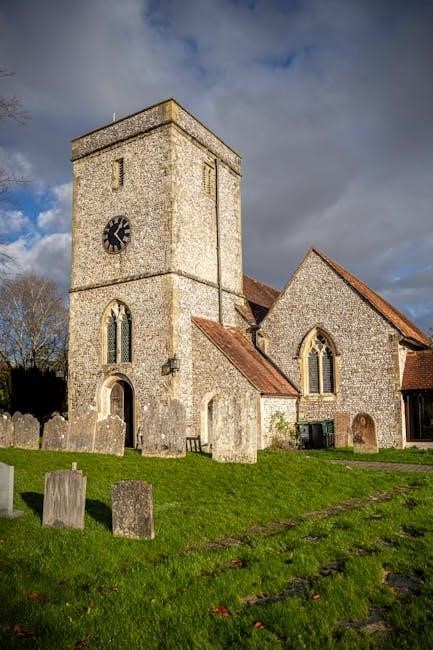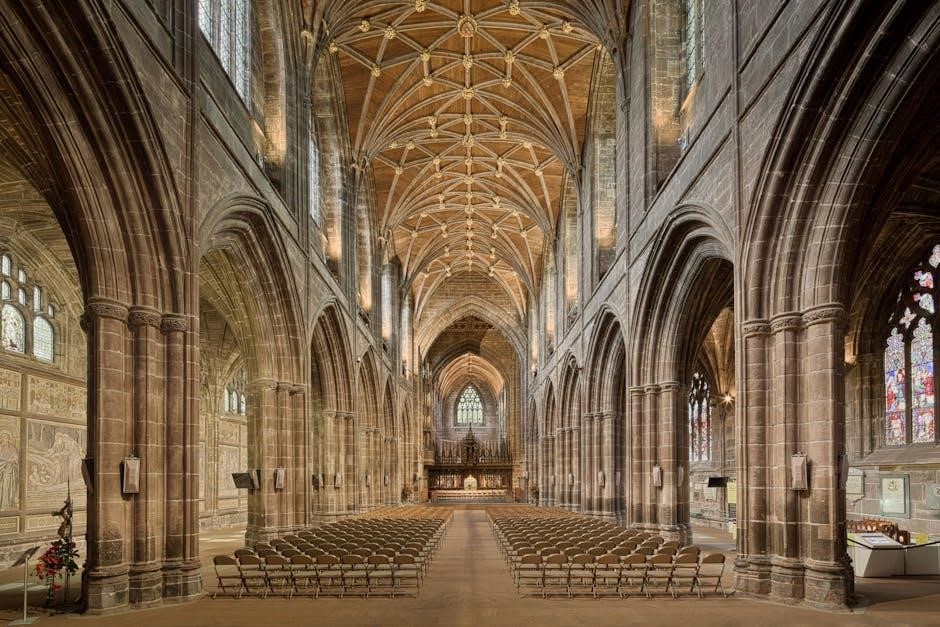Chapter 1: Nature of the Church
The church is a congregation of baptized believers united by faith, practicing New Testament teachings, and gathering for worship, fellowship, and ministry, representing Christ’s body on earth․

1․1 Defining the Church
The church is defined as a congregation of baptized believers united by faith in Jesus Christ, practicing New Testament teachings, and gathering for worship, fellowship, and ministry․ It is not merely a building but a spiritual body, often referred to as the “body of Christ․” The term “church” originates from the Greek word ekklesia, meaning an assembly or congregation called together for a specific purpose․ Baptists emphasize the church as a voluntary association of regenerate individuals, governed by biblical principles and covenants․ The church serves as a vessel for carrying out the Great Commission, fostering spiritual growth, and maintaining unity among believers․ Its purpose is to glorify God, edify saints, and reflect Christ’s love and justice in the world․

1․2 Biblical Context of the Church
The church finds its foundation in the New Testament, where Jesus Christ establishes it as His body on earth․ The term “church” (Greek: ekklesia) refers to a called-out assembly, first mentioned in Matthew 16:18, where Jesus declares, “I will build my church․” The church is portrayed as a spiritual organism, with Christ as its head, united by faith and the Holy Spirit․ In Ephesians 5:25-30, the church is described as the bride of Christ, sanctified and loved by Him․ The early church, as seen in Acts 2, was a community of believers devoted to prayer, fellowship, and the apostles’ teachings․ Biblically, the church is not a building but a living, dynamic body of believers called to worship, serve, and spread the gospel, reflecting God’s glory and purpose in the world․

1․3 The Church as a Congregational Assembly
The church operates as a congregational assembly, where members gather to worship, fellowship, and make decisions collectively․ This model emphasizes the priesthood of all believers, where every member has a voice and role in the church’s governance․ Baptists historically embrace congregational polity, believing that the local church is autonomous and self-governing under the guidance of the Holy Spirit․ This assembly is not merely a formal structure but a living body united in purpose and faith․ The congregation comes together to discern God’s will, elect leaders, and oversee ministries, ensuring that decisions align with biblical principles and the collective conscience of the members․ This approach fosters accountability, unity, and active participation among believers․
1․4 Purpose and Role of the Church
The purpose of the church is to glorify God, fulfill the Great Commission, and serve as a body of believers united in worship, fellowship, and ministry․ Its role is to preach the Gospel, disciple followers of Christ, and provide spiritual guidance to its members․ The church serves as a beacon of hope, offering compassion, support, and service to the community․ It functions as a sanctuary for worship, a platform for evangelism, and a hub for edifying believers․ The church’s mission is to represent Christ’s love and teachings, fostering spiritual growth and unity among its members while impacting the world with the message of salvation and grace․ This dual focus on internal edification and external outreach defines the church’s purpose and role in society․

Chapter 2: Officers of the Church
The church’s officers, including pastors, deacons, and elders, are elected to lead, serve, and maintain order, ensuring the congregation functions effectively and fulfills its spiritual mission․
2․1 The Pastor
The pastor serves as the spiritual leader of the church, responsible for preaching, teaching, and guiding the congregation in biblical truths․ They oversee worship services, provide pastoral care, and ensure the church’s mission aligns with God’s Word․ The pastor also administers ordinances such as baptism and the Lord’s Supper, while fostering unity and spiritual growth among members․ Typically ordained, the pastor is expected to exemplify Christ-like character, demonstrating integrity, humility, and a deep commitment to serving others․ Their role is both inspirational and administrative, ensuring the church functions effectively and remains faithful to its biblical purpose․ The pastor’s influence extends beyond the pulpit, shaping the church’s vision and guiding its members in their walk with Christ․
2․2 Deacons
Deacons are church officers chosen to serve the congregation by addressing practical needs and supporting the pastor in ministry․ Their role, rooted in Acts 6, focuses on caring for members, managing church resources, and maintaining order․ Deacons are typically selected for their godly character, wisdom, and willingness to serve․ They assist in worship services, visit the sick, and help those in need, ensuring the church’s ministries operate effectively․ Deacons work closely with the pastor and other leaders to promote unity and fellowship within the church․ Their service is vital in fulfilling the church’s mission and fostering a caring, supportive community among believers․ Deacons are ordained and expected to lead by example, demonstrating humility and a heart for service․ Their role is both practical and spiritual, enhancing the church’s ability to minister to its members and the wider community․
2․3 Elders
Elders are spiritual leaders in the church, responsible for teaching, praying, and providing oversight to the congregation․ Their role is rooted in Scripture, particularly in 1 Timothy and Titus, where qualifications for eldership are outlined․ Elders are expected to be men of sound doctrine, integrity, and wisdom, serving as examples to the flock․ They work closely with the pastor in preaching, teaching, and shepherding the church․ Elders also assist in administering the ordinances and resolving disputes within the church․ Their primary focus is on the spiritual well-being of the congregation, ensuring the church remains faithful to biblical teachings․ Elders are ordained and expected to lead with humility, providing guidance and encouragement to the church body․ Their role is essential in maintaining the church’s spiritual health and direction․ Elders serve as a vital part of the church’s leadership structure, fostering growth and unity among believers․
2․4 Church Clerk
The church clerk serves as the official record-keeper of the church, maintaining accurate minutes of business meetings, membership records, and other important documents․ This role ensures transparency and accountability in church operations․ The clerk is responsible for handling correspondence, managing legal documents, and maintaining the church’s historical records․ They also assist in preparing for meetings, such as drafting agendas and distributing notices․ The clerk works closely with other church officers to ensure smooth communication and compliance with legal and denominational requirements․ This role is vital for preserving the church’s legacy and ensuring that all actions are properly documented and in order․ The clerk’s duties are both administrative and procedural, supporting the overall functioning of the church․ Their attention to detail and organizational skills are essential for effective church governance․
2․5 Treasurer
The treasurer is responsible for managing the church’s finances, ensuring accountability, and maintaining transparency in all financial transactions․ This includes overseeing the collection of offerings, managing budgets, and ensuring proper disbursement of funds․ The treasurer works closely with the finance committee to prepare financial reports and statements, providing updates to the church membership․ They are also responsible for ensuring compliance with legal and financial regulations, such as tax filings and audits․ The treasurer serves as a steward of God’s resources, ensuring that funds are allocated according to the church’s mission and priorities․ Their role requires strong organizational and financial skills, as well as a commitment to integrity and ethical practices․ The treasurer plays a crucial part in supporting the church’s ministries and operational needs․
2․6 Trustees
Trustees are responsible for the legal and financial oversight of the church, ensuring compliance with laws and regulations․ They manage the church’s property, assets, and investments, acting as stewards of God’s resources․ Trustees oversee the maintenance and improvement of church facilities, ensuring they are safe and functional for worship and ministry․ They also handle legal matters, such as contracts, deeds, and liability issues, protecting the church’s interests․ Trustees work closely with other church leaders to align financial decisions with the church’s mission and goals․ Their role requires wisdom, integrity, and a commitment to upholding the church’s values while managing its temporal affairs effectively․ Trustees play a vital role in safeguarding the church’s future and ensuring its continued ministry and service to the community․ Their oversight is essential for the church’s stability and growth․
2․7 Volunteers and Ministry Leaders
Volunteers and ministry leaders are essential to the life and mission of the church․ They serve in various capacities, from teaching Sunday School to leading outreach programs, ensuring the church’s ministries operate effectively․ Volunteers often assist with events, community service, and administrative tasks, while ministry leaders provide spiritual guidance and oversight to specific areas of church life․ Their roles are vital for fostering fellowship, discipleship, and evangelism․ Ministry leaders are typically chosen for their dedication, spiritual maturity, and ability to inspire others․ Both volunteers and leaders work under the supervision of church officers, ensuring alignment with the church’s vision and values․ Their contributions are crucial for building a vibrant, compassionate, and mission-driven church community․

Chapter 3: Doctrines of the Church
The church’s doctrines center on the authority of Scripture, salvation by grace, believer’s baptism, and the Lord’s Supper, guiding its beliefs and practices․
3․1 Core Baptist Beliefs
The core Baptist beliefs emphasize the authority of Scripture as the final rule of faith and practice․ Baptists affirm salvation by grace through faith alone, rejecting works as a means of salvation․ They practice believer’s baptism by immersion, viewing it as an act of obedience symbolizing spiritual rebirth․ The priesthood of all believers is central, granting every Christian direct access to God without intermediaries․ Baptists advocate for church autonomy, where local congregations self-govern under Christ’s headship․ They uphold the separation of church and state, promoting religious freedom․ These beliefs shape Baptist identity, fostering a commitment to evangelism, discipleship, and worship rooted in biblical teachings․
3․2 Authority of Scripture
The authority of Scripture is a cornerstone of Baptist doctrine, affirming the Bible as the inspired, inerrant, and infallible Word of God․ Baptists believe Scripture is the final authority for all matters of faith and practice, governing individual and corporate life․ The Bible is viewed as fully reliable and sufficient for guiding believers in doctrine, ethics, and worship․ This belief underscores the priesthood of all believers, empowering each Christian to study and interpret Scripture under the Holy Spirit’s guidance․ The authority of Scripture is non-negotiable, shaping Baptist churches’ teachings, policies, and ministries․ It serves as the ultimate standard for discerning truth and ensuring fidelity to God’s revealed will․
3․3 Salvation and Grace
Salvation in Baptist doctrine is rooted in God’s grace, a gift offered freely to humanity through faith in Jesus Christ․ Baptists emphasize that salvation is not earned by works but is received by grace alone, as expressed in Ephesians 2:8-9․ This grace is available to all people, reflecting God’s love and mercy․ Faith is the human response to God’s grace, enabling individuals to trust in Christ for redemption․ Baptists also affirm the doctrine of justification, where believers are declared righteous before God through Christ’s sacrifice․ Salvation is accompanied by regeneration, a spiritual transformation that equips believers to live a life of obedience and holiness․ The church’s role is to proclaim this message, ensuring all people have the opportunity to experience God’s saving grace․
3․4 Baptism and Its Significance
Baptism is a fundamental ordinance in Baptist churches, symbolizing a believer’s union with Christ through immersion in water․ It represents the death of the old self and resurrection into new life in Jesus Christ․ Baptism is performed by immersion, signifying the completeness of the believer’s identification with Christ’s burial and resurrection․ It is an act of obedience to Christ’s command and serves as a public declaration of faith in Him․ Baptism is reserved for those who have personally accepted Jesus Christ as their Savior and Lord, emphasizing individual profession of faith․ This practice underscores the Baptist conviction that baptism should follow a conscious decision to follow Christ, reflecting personal spiritual regeneration and commitment to a life of discipleship․
3․5 The Lord’s Supper
The Lord’s Supper, also known as Communion, is a sacred ordinance in Baptist churches, symbolizing fellowship with Christ and unity among believers․ It commemorates the Last Supper Jesus shared with His disciples before His crucifixion․ The elements of bread and the cup represent Christ’s body and blood, broken and poured out for redemption․ This ordinance is observed as a solemn yet joyful act of remembrance and worship, reflecting on Christ’s sacrifice and resurrection․ It is a means of grace, strengthening believers’ devotion and unity․ Baptists emphasize that participation should be preceded by self-examination and a clean conscience․ The Lord’s Supper is a profound expression of faith, fostering spiritual renewal and anticipation of Christ’s return, while affirming the church’s covenant relationship with God and one another․

Chapter 4: Ordinances of the Church
The church observes two primary ordinances: Baptism and the Lord’s Supper․ These acts of obedience and remembrance symbolize spiritual truths and unite believers in worship and fellowship․
4․1 Baptism
Baptism is an ordinance symbolizing a believer’s death to sin and new life in Christ․ Typically performed by immersion, it represents spiritual cleansing and public declaration of faith․ Baptists practice believer’s baptism, emphasizing conscious decision and profession of faith, distinguishing it from infant baptism․ It is administered by the church, following biblical example, and serves as a prerequisite for church membership․ Baptism signifies unity with Christ and His church, reflecting obedience to His command․ While it does not grant salvation, it publicly testifies to inner transformation․ This sacred act strengthens believers’ commitment and fosters fellowship within the congregation, aligning with Baptist doctrine and practice․
4․2 The Lord’s Supper
The Lord’s Supper, also known as Communion, is a sacred ordinance commemorating Christ’s sacrifice․ It involves partaking of bread and wine, symbolizing His body and blood shed for redemption․ Baptists observe this as a memorial, following Jesus’ command at the Last Supper․ The ordinance fosters spiritual reflection, unity, and renewed commitment among believers․ Churches typically observe it periodically, emphasizing preparation through self-examination and repentance․ Baptists practice “close communion,” restricting participation to baptized believers who are church members in good standing․ This ensures the act’s sacredness and maintains doctrinal integrity․ The Supper strengthens fellowship and deepens devotion, serving as a powerful reminder of Christ’s love and sacrifice․
4․3 Washing of Feet
The Washing of Feet is an ordinance observed by some Baptist churches, symbolizing humility, service, and unity․ Rooted in John 13:1-17, where Jesus washed His disciples’ feet, it emphasizes servant-leadership and mutual submission․ Typically performed during special services or Communion, participants wash one another’s feet as an act of love and humility․ This practice fosters a spirit of brotherhood and reminds believers of their role as servants in the body of Christ․ While not universally practiced among Baptists, it remains a meaningful tradition for those who observe it, reinforcing the teachings of Christ and promoting a deeper sense of community and spiritual connection․
4․4 Benediction

The Benediction is a prayer of blessing and dismissal, typically concluding a worship service․ It serves as a final act of spiritual guidance, offering peace and encouragement to the congregation․ Rooted in biblical tradition, such as Numbers 6:24-26, the Benediction reinforces God’s presence and care in believers’ lives․ It is usually delivered by the pastor or church leader, providing a sense of closure and sending the congregation forth with a divine blessing; While not universally practiced in all Baptist churches, the Benediction remains a meaningful tradition, fostering a spirit of peace and renewal as believers depart to serve in the world․ Its observance varies among Baptist congregations, reflecting diverse traditions and worship styles․

Chapter 5: Government of the Church
Baptist churches operate under congregational polity, emphasizing collective decision-making and equality among members․ Leadership roles guide the church, but authority rests with the congregation, reflecting democratic principles․
5․1 Congregational Polity
Congregational polity is a form of church governance where decision-making authority rests with the local congregation․ This model emphasizes the equality of members, with each believer having a voice in the church’s affairs․ It is rooted in biblical principles, such as the priesthood of all believers, and reflects democratic practices․ In Baptist churches, this system ensures that the church remains autonomous, with no external hierarchy controlling its operations․ Decisions are typically made through collective voting, often during business meetings, ensuring transparency and accountability․ Leaders, such as pastors and deacons, guide the congregation but do not hold absolute authority․ This approach fosters a sense of community and shared responsibility, aligning with Baptist beliefs in the importance of local church autonomy and grassroots decision-making․
5․2 Leadership Roles and Responsibilities
In Baptist churches, leadership roles are designed to support the congregation and fulfill the church’s mission․ Pastors provide spiritual guidance, preach, and oversee worship services․ Deacons assist with pastoral care, manage benevolence, and support the congregation’s needs․ Elders, where present, share preaching and teaching responsibilities․ The church clerk maintains records, handles correspondence, and ensures organizational efficiency․ Treasurers manage finances, ensuring transparency and accountability․ Trustees oversee property and legal matters, while volunteers and ministry leaders organize activities and outreach․ Each role operates under the authority of Scripture and the church’s governing documents, ensuring unity and effectiveness in serving the body of Christ while maintaining congregational autonomy․

Chapter 6: Discipline of the Church
Church discipline is essential for maintaining holiness, order, and accountability within the congregation․ It is rooted in biblical teachings, such as Matthew 18:15-17, and aims to restore erring members while preserving the church’s purity․ The process typically begins with private confrontation, followed by involvement of witnesses, and, if unresolved, the entire church․ Ultimate measures may include exclusion from fellowship, ensuring the church remains a sacred and disciplined body․ This practice reflects the church’s commitment to spiritual integrity and the well-being of its members, guided by Scripture and a spirit of love and restoration․
